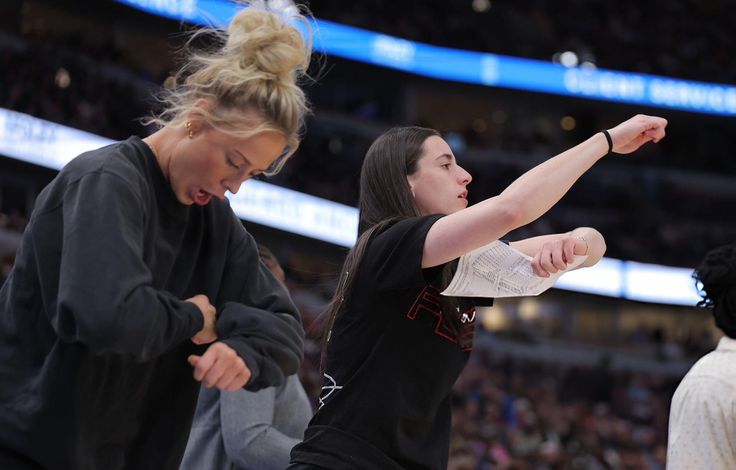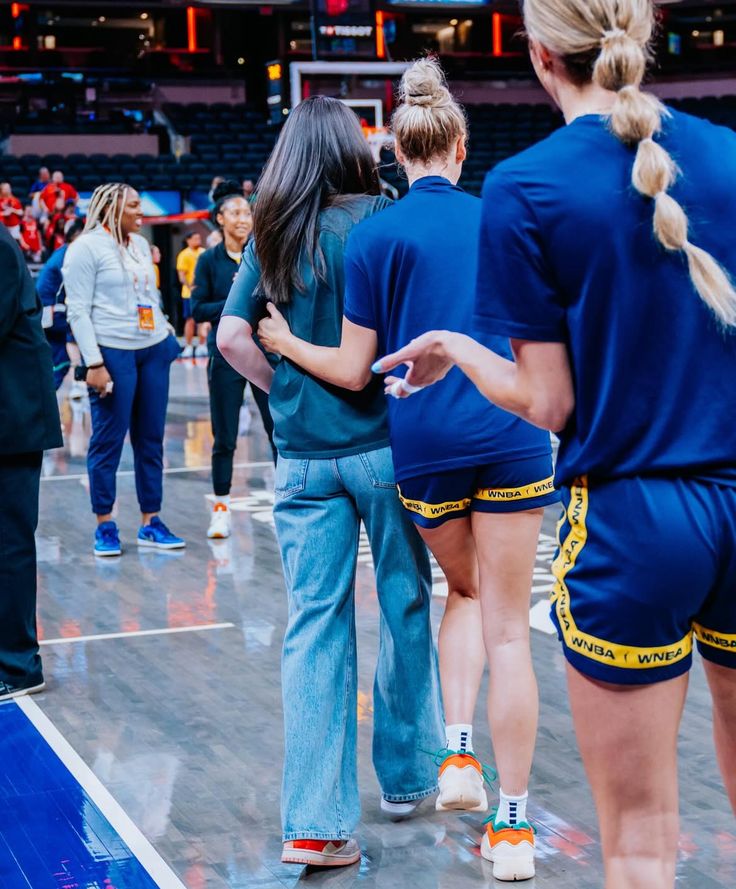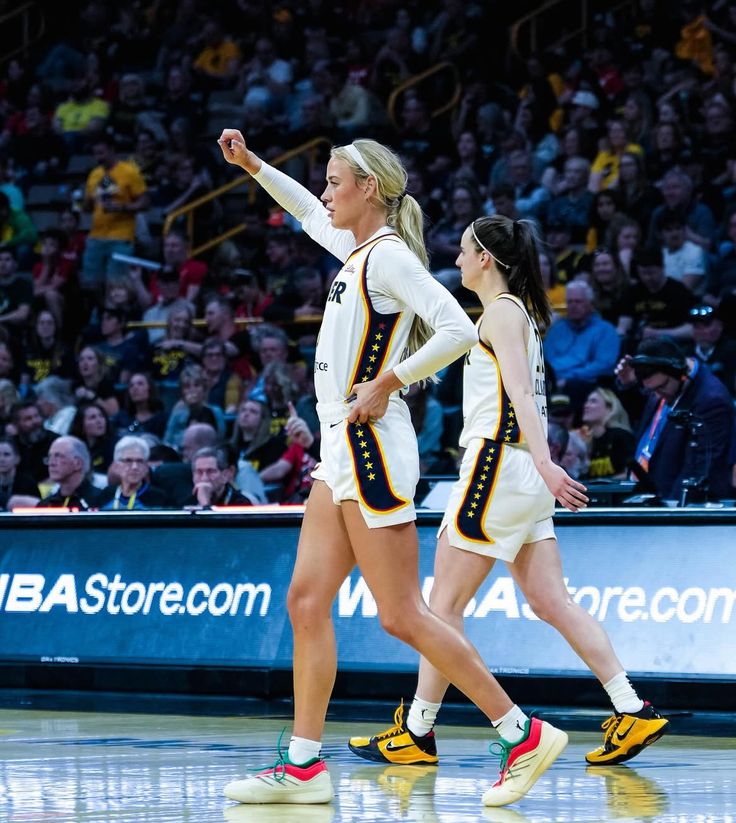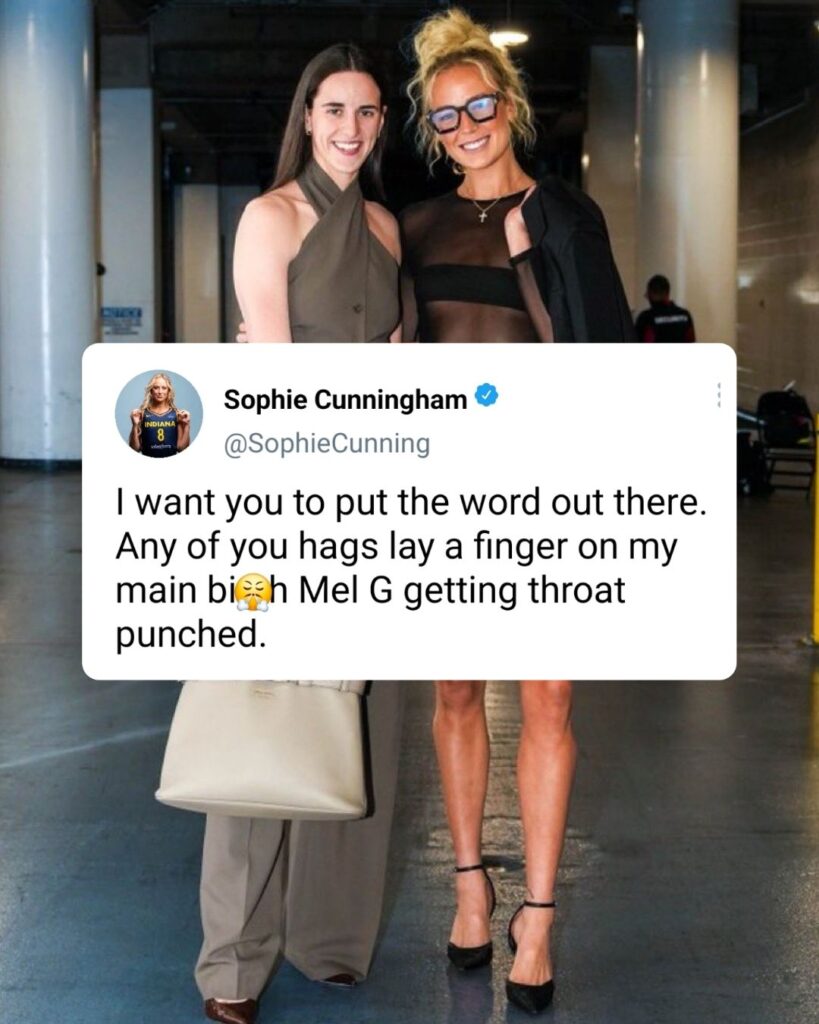Sophie Cunningham Issues Stark Warning to WNBA About Consequences of Failing to Protect Caitlin Clark
The Women’s National Basketball Association finds itself at a critical crossroads as one of its most respected players has delivered a scathing indictment of the league’s failure to protect its biggest star, raising serious questions about the long-term consequences of allowing unchecked aggression against Caitlin Clark to continue unchallenged. Sophie Cunningham, the Indiana Fever guard who has emerged as Clark’s unofficial protector and enforcer, has publicly criticized WNBA officials for their apparent reluctance to adequately shield the league’s most marketable and talented player from increasingly physical and often unnecessary confrontations on the court.

The controversy reached a boiling point during a recent heated matchup between the Indiana Fever and Connecticut Sun, where Cunningham took matters into her own hands by delivering a flagrant foul against Jacy Sheldon in retaliation for what she perceived as yet another unwarranted attack on her superstar teammate. “It was a buildup for a couple of years now of them just not protecting the star player of the WNBA,” Cunningham explained in her post-game comments, making it abundantly clear that her actions were not spontaneous but rather the result of mounting frustration with the league’s inconsistent officiating standards.
Cunningham’s bold stance has transformed her into an unlikely folk hero among basketball fans, with her social media following exploding by over 800,000 new followers who have rallied behind her willingness to stand up for Clark when the officials seemingly won’t. The veteran guard’s message to the WNBA hierarchy is unmistakably clear: if the league’s referees continue to turn a blind eye to the physical intimidation tactics being employed against Clark, then players like herself will be forced to take justice into their own hands, regardless of the personal consequences they might face.

The implications of Cunningham’s warning extend far beyond a single incident or personal grievance, as her criticism highlights a systemic problem that could potentially undermine the WNBA’s credibility and damage its carefully cultivated image as a professional sports organization committed to fair play and player safety. WNBA referees have been under fire all season for swallowing their whistle on plays involving Clark, who has been pushed around by many of the league’s veteran players, creating a dangerous precedent that suggests certain players are fair game for aggressive tactics that would normally result in technical fouls or ejections.
The financial and reputational stakes for the WNBA could not be higher, as Clark represents not only the league’s most recognizable face but also its primary driver of television ratings, merchandise sales, and overall fan engagement, making her protection from unnecessary physical confrontations a critical business imperative rather than merely a matter of sportsmanship. Cunningham’s intervention has forced the league to confront uncomfortable questions about whether it is inadvertently allowing veteran players to engage in behavior that could potentially shorten Clark’s career or diminish her effectiveness on the court, thereby jeopardizing the WNBA’s long-term growth prospects and commercial viability.

The broader basketball community has taken notice of Cunningham’s principled stand, with many observers praising her willingness to sacrifice her own reputation and face potential disciplinary action in order to protect a teammate who has brought unprecedented attention and legitimacy to women’s professional basketball. Her actions have sparked intense debate about the unwritten rules of basketball, the role of enforcers in modern sports, and the responsibility of leagues to ensure that their most valuable assets are adequately protected from competitors who may be motivated by jealousy, resentment, or strategic considerations rather than legitimate competitive spirit.
Cunningham’s warning serves as a wake-up call for WNBA commissioners and officials who must now decide whether they will take proactive steps to address the inconsistent officiating that has allowed Clark to become a target, or continue to risk the escalation of on-court tensions that could result in more serious altercations and potential injuries. “It was a buildup for a couple of years now of them just not protecting the star player of the WNBA,” she emphasized, suggesting that this is not an isolated incident but rather part of a troubling pattern that requires immediate institutional intervention.

The consequences of ignoring Cunningham’s warning could be severe for the WNBA, as continued failure to protect Clark could lead to more players taking enforcement into their own hands, potentially creating a culture of retaliation and escalating violence that would be detrimental to the league’s family-friendly image and its efforts to attract mainstream corporate sponsors and television partners. The league must now grapple with the reality that one of its own players has essentially issued an ultimatum: either the officials start doing their job properly, or players will continue to police the game themselves, regardless of the potential chaos that might ensue.
As the WNBA moves forward, Cunningham’s bold stance and public criticism have fundamentally altered the conversation around player protection, officiating standards, and the league’s commitment to maintaining a competitive environment that allows its brightest stars to flourish without fear of unnecessary physical intimidation or retribution from opponents who may be struggling to match their on-court achievements through legitimate basketball skills alone.